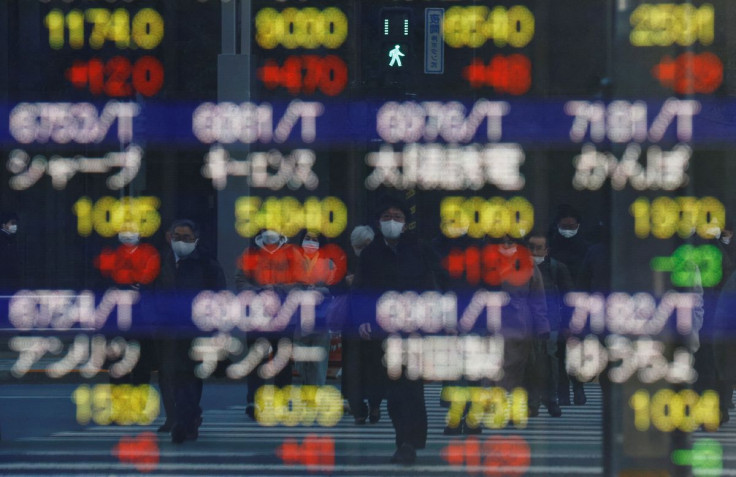Stocks Gain As Risk Sentiment Improves, Oil Steadies

Shares rose broadly across Asia on Monday, building on morning gains and a Friday Wall Street rebound as sentiment improved and oil prices steadied, tempering fears of prolonged inflation.
Treasury yields remained subdued and the dollar hovered near the lowest in more than a week as investors continued to assess the outlook for U.S. rate hikes, and the potential for a recession.
Japan's Nikkei rallied 1.51%, while Australia's benchmark jumped 2.03% and looked set for its best day in more than six weeks.
Chinese blue chips rose 1.17% and Hong Kong's Hang Seng advanced 2.39%.
South Korea's KOSPI gained 1.83%.
MSCI's broadest index of Asia-Pacific shares rose 1.81%.
U.S. stock futures are up slightly by 0.8% after falling earlier in the day. On Friday, the S&P 500 surged more than 3%, adding to an almost 1% gain on Thursday.
FTSE futures and EUROSTOXX 50 futures both rose 0.45% ahead of the start of European market trading.
"I don't think anyone's got any smoking guns for this market right now," said Chris Weston, head of research at Pepperstone. "If you're looking for proper risk-on, all markets moving the same direction, correlation across asset classes going to 1, we're not seeing that today."
"The Aussie's the worst performer, the yen's the best performer, you're not seeing much love in crypto, there's no real move in the energy space. It's more of an equities story today."
Crude oil fell in volatile trading on Monday as the market grapples with concerns that a global economic slowdown could depress demand versus worries about lost Russian supply amid sanctions over the Ukraine conflict.
Both Brent and U.S. West Texas Intermediate (WTI) futures were flat on the day after back-and-forth trading in the morning. Brent is up 0.1% at $113.2 a barrel, while WTI fell 0.01% to $107.63.
U.S. long-term Treasury yields hovered around 3.16% after bouncing off a two-week low just above 3% at the end of last week as traders removed bets for hikes next year, but still pondered if aggressive tightening this year could trigger a recession.
Yields have dropped from 3.456%, the highest in more than a decade, reached before the mid-month Fed meeting. Then, the central bank hiked rates by 75 basis points, the biggest increase since 1994, and signalled that a similar move is possible in July.
"The market remains focused in the trade-off between the policy response to high inflation and fears of a hard landing," Westpac rates strategist Damien McColough wrote in a client note.
"There will be ongoing discussions as to whether long-end yields have peaked, however we would not yet expect 10-year yields to fall materially or sustainably below 3%."
The dollar was steady on Monday, continuing to consolidate near the lowest since the middle of the month against major peers.
The dollar index - which measures the currency versus six rivals - was little changed at 103.950, after gradually gravitating over the past few sessions toward the June 17 low of 103.83.
Gold ticked 0.49% higher to $1,835.16 per ounce.
Bitcoin was flat, trading at $21,170.88 after falling as low as $17,588.88 earlier this month.
© Copyright Thomson Reuters 2024. All rights reserved.




















